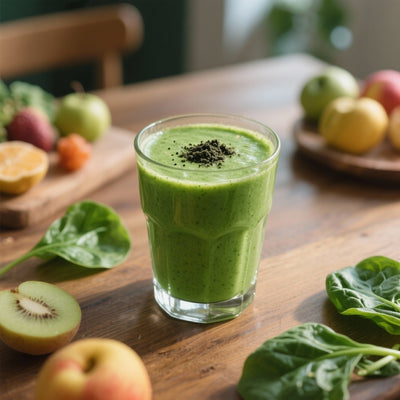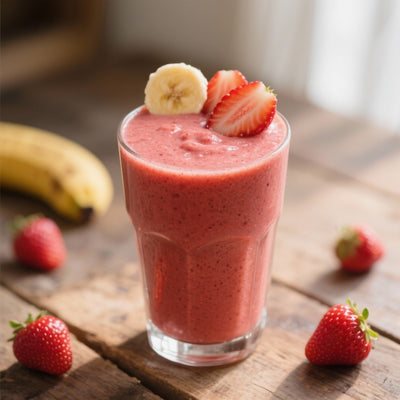Intermittent Fasting and Supplements: The Perfect Combo for Optimal Health?
Intermittent fasting (IF) has become a popular practice for weight management, improving metabolic health, and even increasing longevity. But what about combining it with supplements? Is this a winning strategy for maximizing the benefits of intermittent fasting? In this article, we'll explore this question in depth and give you the keys to an informed approach.
We'll break down the benefits of intermittent fasting, the most relevant supplements to consider, and how to intelligently integrate them into your routine to maximize results. Get ready to discover if intermittent fasting and supplements can truly be the perfect combination for your well-being.
What is Intermittent Fasting and Why is it Popular?
Intermittent fasting is not a diet, but rather a way to plan your meals. It alternates between periods of fasting and periods of eating. The most common methods include the 16/8 (16 hours of fasting, 8 hours of eating), the 5:2 (5 days of normal eating, 2 days of calorie restriction), and Eat-Stop-Eat (one or two 24-hour fasts per week).
Its growing popularity is due to its many potential benefits, including weight loss, improved insulin sensitivity, reduced inflammation, and promotion of autophagy (a cellular cleanup process).
The Potential Benefits of Intermittent Fasting:
- Weight Loss: By limiting your eating window, you naturally reduce your calorie intake.
- Improved Insulin Sensitivity: JI can help regulate blood sugar and improve insulin sensitivity, which is especially beneficial for people with insulin resistance or type 2 diabetes.
- Reduction of Inflammation: Studies suggest that JI can reduce inflammatory markers in the body.
- Promoting Autophagy: Fasting stimulates autophagy, a process essential for eliminating damaged cells and maintaining cellular health.
What Supplements Should You Consider During Intermittent Fasting?
While intermittent fasting can be beneficial in itself, certain supplements can help optimize its effects and address potential deficiencies.
Shilajit: A Powerful Ally for Intermittent Fasting
Shilajit is a rare resinous substance, rich in fulvic acid and minerals, used for centuries in Ayurvedic medicine. It can be particularly beneficial during intermittent fasting for several reasons:
- Source of Essential Minerals: Fasting can sometimes lead to mineral deficiencies. Shilajit provides a wide range of essential minerals to support bodily functions.
- Natural Energy Boost: Shilajit can help fight fatigue and improve energy levels, which can be helpful during periods of fasting.
- Enhanced Cognitive Function: Studies suggest that shilajit can improve memory and concentration, which may be beneficial for maintaining mental clarity during fasting.
Other Potentially Useful Supplements:
- Electrolytes: Sodium, potassium, and magnesium are essential for maintaining hydration and electrolyte balance, especially during fasting.
- Multivitamins: To address potential vitamin and mineral deficiencies.
- MCT oil: A source of healthy fats that can help suppress appetite and provide energy during fasting.
- Creatine: Can help maintain muscle mass during fasting, especially if you exercise.
How to Optimally Integrate Supplements into Intermittent Fasting?
It is crucial to consult a healthcare professional before starting to take supplements, especially if you are following intermittent fasting. Here are some general tips:
- Prioritize Quality: Opt for high-quality supplements from reliable sources. For example, choose PURVAL Shilajit to guarantee purity and effectiveness.
- Follow the Recommended Dosages: Do not exceed the doses recommended by the manufacturer or your healthcare professional.
- Consider Your Health Condition: Some supplements may interact with medications or be contraindicated in certain medical conditions.
- Experiment and Adapt: Everyone is different. Listen to your body and adjust your approach according to your needs and reactions.
Precautions and Contraindications
Intermittent fasting and taking supplements are not suitable for everyone. It is essential to take certain precautions:
- Consult a healthcare professional: Before starting intermittent fasting or taking supplements, consult your doctor, especially if you have pre-existing health conditions (diabetes, eating disorders, etc.).
- Pregnant or breastfeeding women: Intermittent fasting is generally not recommended during pregnancy and breastfeeding.
- Elderly people: Medical supervision is recommended for elderly people who wish to practice intermittent fasting.
Intermittent Fasting and Supplements: A Personalized Approach
Intermittent fasting can be a powerful tool for improving your health, and certain supplements, such as shilajit, can help optimize its effects. However, it's crucial to adopt a personalized approach, based on your individual needs, health status, and the guidance of a healthcare professional. Remember that the key to success lies in moderation, listening to your body, and finding balance.
To learn more about Shilajit and its benefits, check out our blog and discover our recipes to easily incorporate it into your routine!











